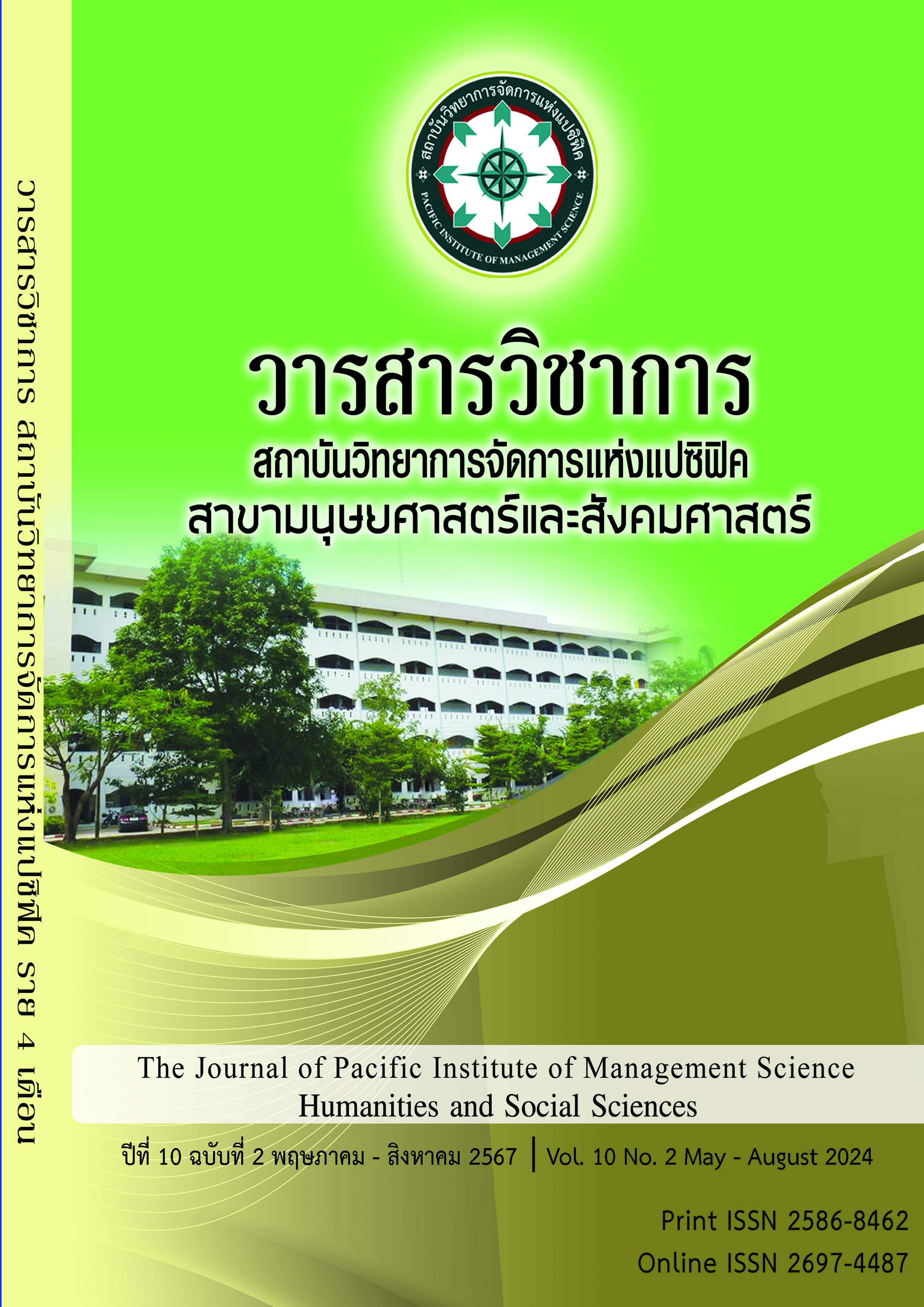The Development of learning management theory system and LOCAL STEM Waengnoi district to encourage science skill
Keywords:
Model development, Learning management, Learning management (LOCAL STEM), Local learning resources, Waengnoi district, Encourage science skillAbstract
This research aimed to 1) study basic information on the development of learning management models based on the concept of learning management (LOCAL STEM) in conjunction with the concept of learning management of local learning resources, Waengnoi district, to promote science process skills for Mathayom 6 students. 2) to develop learning management models based on the concept of learning management (LOCAL STEM) in conjunction with the concept of learning management of local learning resources, Waengnoi district, to promote science process skills for Mathayom 6 students. This quantitative research used a questionnaire to collect opinions of parents of students on learning management using the learning management model. The statistics used for data analysis were mean, standard deviation, percentage, and hypothesis testing using t-test (Dependent Sample).
The research results found that 1. The results of the study of basic information on the development of learning management models based on the concept of learning management (LOCAL STEM) in conjunction with the concept of learning management of local learning resources, Waengnoi district to promote science process skills for Mathayom 6 students found that students had opinions on the current state of learning management, Waengnoi district, to promote science process skills. Overall, it was at a low level (mean = 2.37, S.D. = 0.59) and the need for organizing learning, the Waengnoi district, to promote science process skills, was overall at the highest level (mean = 4.54, S.D. = 0.54). 2. The results of developing a learning management model based on the learning management concept (LOCAL STEM) combined with the learning management concept of local learning resources, the Waengnoi district, to promote science process skills for Mathayom 6 students found that the learning management model had 4 components
References
กิติมา ปัทมาวิไล, & สุเทพ อ่วมเจริญ. (2559). การพัฒนารูปแบบการเรียนการสอนที่เสริมสร้างทักษะการให้เหตุผล การแก้ปัญหาและการสื่อสารทางคณิตศาสตร์ระดับชั้นมัธยมศึกษาปีที่ 5. วารสารวิชาการมหาวิทยาลัยศิลปากร ฉบับภาษาไทย สาขามนุษยศาสตร์ สังคมศาสตร์ และศิลปะ., 9(3).
ธนภรณ์ ก้องเสียง. (2558). การพัฒนาทักษะกระบวนการทางวิทยาศาสตร์ โดยใช้กิจกรรมการทดลองวิทยาศาสตร์เสริมการเรียนรู้ สำหรับนักเรียนชั้นมัธยมศึกษาปีที่ 1: กรณีศึกษาโรงเรียนปราโมทวิทยารามอินทรา. วิทยานิพนธ์ ค.ม. กรุงเทพฯ:มหาวิทยาลัยเทคโนโลยีราชมงคลธัญบุรี.
นัสรินทร์ บือชา. (2558). ผลการจัดการเรียนรู้ตามแนวคิดสะเต็มศึกษา (STEM Education) ที่มีต่อผลสัมฤทธิ์ทางการเรียนชีววิทยา ความสามารถในการแก้ปัญหาและความพึงพอใจต่อการ จัดการเรียนรู้ของนักเรียนชั้นมัธยมศึกษาปีที่ 5. วิทยานิพนธ์ศึกษาศาสตรมหาบัณฑิต. มหาวิทยาลัยสงขลานครินทร์.
นุชรี วงค์แก้ว(,ม.ป.ป.)คู่มือแนวทางการจัดการเรียนรู้ตามแนวทางสะเต็มศึกษา STEM Educationสำหรับ
ครูผู้สอนกลุ่มสาระการเรียนรู้วิทยาศาสตร์และเทคโนโลยีระดับชั้นประถมศึกษาปีที่6กลุ่มนิเทศ ติดตามและประเมินผล สำนักงานศึกษาธิการจังหวัดแพร
เบญญาภา คงมาลัย และ ศรเนตร อารีโสภณพิเชฐ. (2558). การพัฒนาสมรรถนะการจดัการ ความรู้
ของนิสิตนกัศึกษาระดับอุดมศึกษาในศตวรรษที่ 21. วารสารครุศาสตร์, 43 (1), 37 - 47.
แผนพัฒนาเศรษฐกิจและสังคมแห่งชาติฉบับที่ 12 (พ.ศ2560-2564)
ศิริพร ครุฑกาศ, และคณะ, (2558).การวิเคราะห์องค์ประกอบเชิงยืนยันของทักษะการแก้ปัญหาในนักศึกษา
วิทยาลัยพยาบาล สังกัดสถาบันพระบรมราชชนก,วารสารวิจัยทางวิทยาศาสตร์สุขภาพ,9(2).45-51
Morrison J. 2006. “TIES STEM Education Monograph Series: Atributes of STEM
Education”. Baltimore, MD:TIES, (2): 5.
Downloads
Published
Versions
- 2023-09-30 (2)
- 2024-08-31 (1)
Issue
Section
License
Copyright (c) 2024 Pacific Institute of Management Science

This work is licensed under a Creative Commons Attribution-NonCommercial-NoDerivatives 4.0 International License.
บทความที่ได้รับการตีพิมพ์เป็นลิขสิทธิ์ของ สถาบันวิทยาการจัดการแห่งแปซิฟิค
ข้อความที่ปรากฏในบทความแต่ละเรื่องในวารสารวิชาการเล่มนี้เป็นความคิดเห็นส่วนตัวของผู้เขียนแต่ละท่านไม่เกี่ยวข้องกับสถาบันวิทยาการจัดการแห่งแปซิฟิค และคณาจารย์ท่านอื่นๆในสถาบันฯ แต่อย่างใด ความรับผิดชอบองค์ประกอบทั้งหมดของบทความแต่ละเรื่องเป็นของผู้เขียนแต่ละท่าน หากมีความผิดพลาดใดๆ ผู้เขียนแต่ละท่านจะรับผิดชอบบทความของตนเองแต่ผู้เดียว







